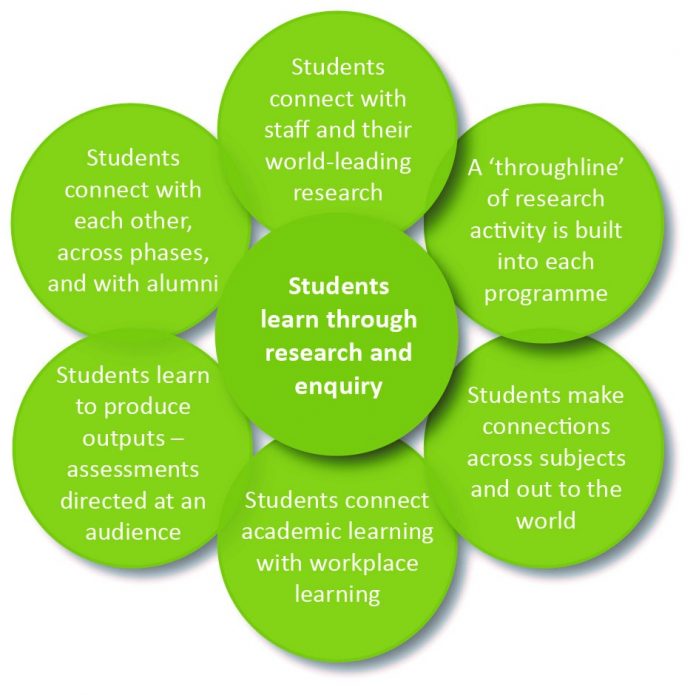Institutions across the world are increasingly looking at fresh possibilities of making connections between their research and students educations. Dr Dilly Fung explains three new, interrelated initiatives at University College London (UCL) that are designed to make research and education inspire and strengthen each other.
Connected Curriculum at UCL is a framework for developing a fuller range of ways in which students can become involved with the institution’s world-leading research. It commits UCL – a large institution with diverse research, professional and learning communities – to providing the best possible educational experience for all of its students.
Learning through research
The framework centres around the core principle that ‘Students learn through research and collaborative enquiry’, and has six related dimensions. These dimensions are all aimed at inspiring students to develop the understandings, skills and attitudes of researchers, to work alongside UCL’s world-renowned researchers and to engage with the institutions Grand Challenges.
Promoting a greater awareness of international contexts, the initiative provides a means of building on UCL’s already successful Global Citizenship programme. It also promotes opportunities for students and staff from very different disciplines to collaborate in interdisciplinary spaces. The innovative BASc programme, which develops research-based expertise in arts and sciences, is a forerunner of these principles, as is UCL’s new Integrated Engineering Programme.
Connected Curriculum is not just a new, visual representation of ‘good’ curriculum in a research-intensive setting – it’s a key strand of UCL’s institutional strategy. Following the appointment of President and Provost Prof Michael Arthur in 2013, a UCL 2034 strategy was developed, which commits the institution to becoming ‘A global leader in the integration of research and education, underpinning an inspirational student experience’:
‘Our students will participate in the research process and the creation of knowledge, supported by our academic and research staff. They will understand the ‘edge of knowledge’ and learn how to deal with uncertainty. Through this integrated approach, they will develop their critical independent thinking skills, become confident problem solvers, be well versed in communicating complex information and experienced at working in a team. With these skills, our graduates will excel in the workplace and be highly valued contributors across all walks of life.’ (UCL 2034, Theme 2)
Such an ambitious initiative requires the commitment of resource. UCL is building a team of Connected Curriculum Fellows – fractionally seconded academics and professional specialists from a wide spectrum of subject areas – who are both championing research-based education in their own areas and collaborating on cross-cutting initiatives.
Led by a Steering Group which brings together academic and professional stakeholders and student representatives, the initiative is promoting a range of new developments in programmes of study. And although it needs investment, it’s also creating opportunities for staff in a wide range of different roles to benefit from working and developing across the traditional research-teaching boundaries.
Connecting and rewarding staff engaged in research-based education
Enhancing research-based education requires new ways of thinking about staff development, reward and recognition. Staff can be busy and many are still juggling the priorities of research, teaching, public engagement and other dimensions of academic practice, so engagement can be a challenge.
To help overcome this, UCL has set up a parallel initiative to support the strategy. The UCL Arena scheme, accredited by the Higher Education Academy in line with the UK Professional Standards Framework (UKPSF), has drawn together more than 2,000 members of staff since its launch in April 2014. The UCL Arena Open events programme provides opportunities for all voices to be heard and valued – academic and professional, early career and experienced – and for practices and creative thinking to be shared.
By developing their approaches to research-based education, staff are also able to gain professional recognition, for example as fellows or senior fellows of the Higher Education Academy. This in turn is contributing to UCL’s current review of its current academic roles and promotion criteria. The review aims to ensure that all staff are appropriately recognized and rewarded, and that staff who make an outstanding impact through leading on education can be recognized as full Professors. Awards gained through UCL Arena can make a significant contribution to an individual’s application for promotion, by providing peer-reviewed evidence of successful practice.
Students as partners
A second parallel innovation is UCL ChangeMakers, a scheme which brings together a wide range of ways in which students can contribute to and even lead on institutional change. This includes students’ close involvement with the Connected Curriculum initiative at all levels of activity, and their engagement with UCL Arena.
UCL ChangeMakers is still in development and will be launched fully in April 2015, but a key strand already being piloted gives students the opportunity to work together, with the support of staff, on institutional research projects. The UCL ChangeMaker Projects scheme offers students the opportunity to investigate an idea which they feel will improve students’ learning or the wider student experience. Students can apply for funding to ‘enhance, improve, enrich, diversify and innovate’ aspects of education at UCL for themselves, for their peers and for future students. Through this, they develop skills in teamwork, project management and leadership, which in turn can be recognized on their Higher Education Achievement Record.
Building on synergies
Overall, these interrelated initiatives are creating numerous opportunities to review traditional practices and break down some of the old boundaries between research and education, between ‘academic’ and ‘professional’, between staff and students. Although they involve investment, as is typical with large-scale institutional change, they also bring opportunities for making more productive and creative connections between the people, activities and values which make up UCL’s vibrant community.
Dr Dilly Fung is director of the Centre for the Advancement of Learning and Teaching (CALT) at UCL








